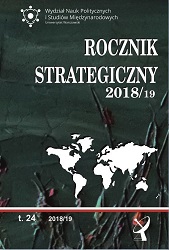
We kindly inform you that, as long as the subject affiliation of our 300.000+ articles is in progress, you might get unsufficient or no results on your third level or second level search. In this case, please broaden your search criteria.

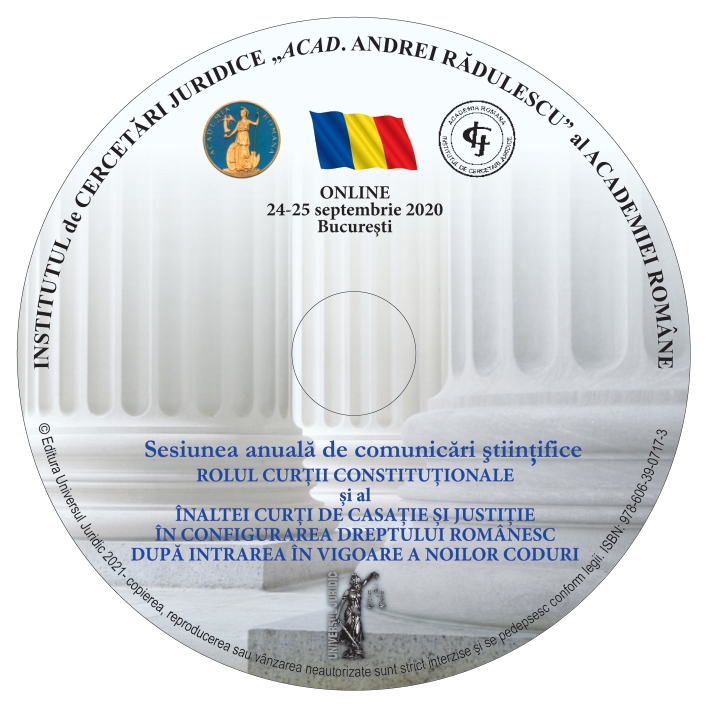
The article analyses how the jurisprudence of the Constitutional Court and the High Court of Cassation and Justice influenced the regulation of certain legislative solutions regarding the jurisdiction of the courts. Specifically, the legislative changes regarding the material competence for the resolution of the cases in the first instance and in the appeal operated by Law no. 310/2018 as a result of Decision no. 369/2017 of the Constitutional Court; the modifications operated regarding the optional competence, by the same normative act, following the Decision no. 7/2016 of the High Court of Cassation and Justice (appeal in the interest of the law) and Decision no. 290/2018 of the Constitutional Court, as well as on the reasons and the competence to solve the relocation of civil cases, related to the Decisions no. 558/2014 and 169/2016 of the Constitutional Court.
More...
By this paper, the author analyzes a recent issue regarding insolvency procedures, by which, prima facie, the relation between public and private interests is reconfigured. The first part concerns the manner of development and the nature of the regulations relating bankruptcy proceedings, namely insolvency proceedings. The author indicates the role and responsibilities of the syllable judge, both from a historical perspective and in the current regulation. In the second part, the author analyses the nature of the institution of seizure insurance in criminal matters and its effects in insolvency proceedings, concluding in the same manner as in Decision no.1/2020.
More...
The improvement of the norms of civil law has been a continuous concern in the recent period, the achievement of this major scientific step being accelerated by the profound transformations of the Romanian society, in the context of assimilating the contemporary European values and of the permanent evolution of the consecrated ideological concepts. Thus, the work of harmonizing the national legislation, together with the recent reform of the law systems inspired by the Napoleonic French Civil Code, as well as the dynamics of social relations have forced the rethinking of some of the general principles of civil law and demands the protection of new socio-moral, cultural values, economic and technical-scientific. With the exception of the new codes, new concepts appeared, new legal regulations were imposed, which made the interpretation of the law ununitary. Thus, with the legislative changes shown, the need for the intervention of the Constitutional Court has been more current than ever, helping to clarify and settle certain issues of law. The present work, approached from the point of view of civil, but also criminal, legal provisions, aims to show to what extent it has changed, shaped or configured the Romanian law Decision of the Constitutional Court no. 387 of May 27, 2015, regarding the provisions of art. 29 paragraph (1) lit. i) of the Government Emergency Ordinance no. 80/2013 regarding stamp court fees.
More...
This study aims to demonstrate that the High Court of Cassation and Justice was not a legislator when it has issued the decision no. 7/11.02.2019, in the sense that it did not add extra requirements to art. 8 par. (5) of the Law no. 77/2016 when it ruled that the courts, upon ruling on claims regarding the termination of obligations arising out of loan agreements, have to analyse the fullfilment of the rebus sic standibus.
More...
Judicial practice, particularly in higher courts, is an increasingly important argument for the sentencing of legal disputes, which is also part of a phenomenon that is al so manifested in other systems of law, which is the strengthening of its status of an effective source of law in general, and administrative law, in particular. If, at the Supreme Court level, for reasons primarily concerning its role in the unification of practice, access to jurisprudence is to a decisive extent, the lower courts offer such public service only in a limited and selective manner. The absence of explicit regulation of judgments as information in the public interest and of a regime of access to them, or of the general obligation of courts to make them public, at their own motion or at request, in full, together with the conflicting positions expressed over time by the Superior Council of Magistracy, led to an ununified application of Law no. 544/2004 on free access to public interest information. The projects of online publication of judgments in public-private partnerships are not such as to rigorously satisfy the requirements of the principle of without charge and free access to judgments, and the practice of selecting and publishing „relevant” court rulings creates distrust, in terms of without charge and free access objectives, given the lack of criteria to establish such character. A future law solution is either the explicit regulation of the judgement as part of the category of public interest information, with the establishment of the related regime, or the establishment, by the law of the organization and functioning of the national judicial system, of the obligation to publish the given rulings, in full.
More...
The article briefly examines the problem of repairing the damages caused to the persons injured by administrative acts, by the unjustified refusal to solve a request or by the failure to solve it in time. In applying the dispositions of art. 52 paragraph (1) of the Romanian Constitution, the public authorities and institutions are responsible for patrimonial damages, for material or moral damages caused by administrative acts, in typical or assimilated form. This administrative-patrimonial liability is doubled by the joint and several patrimonial liability of the dignitary, civil servant or contract staff for the material or moral damages caused by administrative acts. The legal provisions confer a passive procedural quality to the person who contributed to the elaboration, issuance, adoption or conclusion of an administrative act only if it is called in court together with the public authority and only in the case where the request for a court has the object, besides the cancel of the act administrative or obliging the public authority to solve a request, and the payment of damages for the repair of the damages by the typical administrative act or assimilated. The right of the person injured by an administrative act to repair damages, material or moral, constitutes an essential guarantee for the observance of the fundamental rights and freedoms guaranteed by the Romanian Constitution.
More...
In principle, the law is defined by the normative acts that regulate it. In the configuration of the law, the role of the High Court of Cassation and Justice, but also of the Constitutional Court are specified through the legal texts. They are called upon to rule where either the provisions of the supreme law of the country are violated, or the texts of the law are liable to different interpretations, thus giving rise to different solutions of the courts applying the law. That is why the role of the two courts, one judicial and the other constitutional, is particularly important in terms of the consequences it determines. What is established by a decision of the High Court or of the Constitutional Court can be contradicted only by another decision issued by the same court, or without effect by modifying the law. Starting with 2009 - the entry into force of the New Penal Code and continuing with the entry into force of the other codes: penal procedure, civil and civil procedure, on the one hand, the legal language used in the old codes was wanted, and on the one hand putting the law in line with the innovations and changes undergone over time. But the new codes were far from perfect, some of them even needed to be republished, and the High Court and the Constitutional Court were insistently called upon to cover all the shortcomings and illegality found, so me decisions having even interdisciplinary impact, such as the Procedural Code. in conjunction with the Labor Code.
More...
The New Romanian Civil Code (Law No. 287/2009) regulates in articles 1730-1739 the general procedure regarding the exercise of the pre-emption right in the case of the sale contract, following the a priori or a posteriori method. Law no. 17/2014 (in force from April 11, 2014) regulates, through a special procedure, the obligation to respect the right of pre-emption for the sale and purchase of the agricultural lands loca ted outside the city limits, which belongs to the co-owners, lessees, neighbours owners and the Romanian State, through the State Domains Agency. Considering that understanding the right of preemption in its present form is not an easy task, This article aims to present in a logical manner the decisions of the Constitutional Court and of the High Court of Cassation and Justice, relevant for the pre-emption procedure and for the process of implementing the Law no. 17/2014
More...
A judicial authority found the crime against the background of initiation of actions for the establishment and functioning in accordance with the law of T.R.C. II R.F. High School from T.M. On 2017 the Law was passed establishing the T.R.C II R.F. High School from T.M. for legalisation. By decision no. 118/19.03.2018, Constitutional Court sustained the objection of unconstitutionality, noting that the above-mentioned Law was unconstituional. Neither the measures initiated at public institutions within the executive authorities nor cases pending before the courts failed to legitimize the set up of above-mentioned High School, the fundamental right to learn of interested people being not respected.
More...
In fulfilling the constitutional role of ensuring the unitary interpretation and application of the law, the High Court of Cassation and Justice has a new mechanism, namely that of issuing a preliminary ruling for the disclosure of some questions of law, together with the other mechanism available to the supreme court and namely the appeal in the interest of the law. Unlike an appeal on points of law, pursuing the same goal, namely the unification of jurisprudence, preliminary rulings do not intervene after the final resolution of cases but before resolving them, so they can not affect the criminal judgments already delivered. That we face a mechanism that does not value an appeal but is a procedural incident which solves a question of law has arisen in an ongoing process and depends on the merits unraveling.
More...
In this paper, the author carries out a brief case-law analysis of the Constitutional Court of Romania, which is relevant for the configuration of the complaint against non-prosecution and non-indictment solutions. The article is structured in four parts. The first concerns a brief history and a list of legislative changes to the reference provisions. The second and third parts examine the case-law of the Constitutional Court of Romania with regard to Articles 340 and 341 of the Criminal Procedure Code, and the last part, acts as a conclusion, which brings together the author's considerations relating to the analysis undertaken.
More...
The judge, when determining the factual framework of a criminal trial, is often required to adress to some technical issues to find out whether a particular fact meets the constituent elements of a crime. The technical support offered to the prosecutor or the judge in the criminal process should be provided by persons who have the status of expert and who prepare expert reports, which are means of evidence in the criminal process. The legislation that norms the conditions for disposition of an expert report has changed in recent years, being challenged on several occasions for constitutional flaws. The Constitutional Court of Romania through its decisions had a major role on the current configuration of the criminal procedural rules that regulate the expertise in the criminal process. In this context, it can be argued that the case law of the Constitutional Court has influenced the criminal procedural legislation in the field of scientific evidence, having particularly important consequences in the criminal cases on the role of the Romanian courts.
More...
The application of the compensatory mechanism in good conduct times, conceived as a general measure of relieving the detention institutions, as expected, has create d certain problems regarding the legal interpretation of some situations. One of these situations was the one regarding the competence of solving the application by which a person deprived of liberty requested the granting of the compensatory days for the rest of the sentence resulting from a previous conviction and which was found in the sentence in which the execution was. The legal problem was solved by the High Court of Cassation and Justice by Decision no.8 of March 11 th , 2019, a decision that we discuss in the article
More...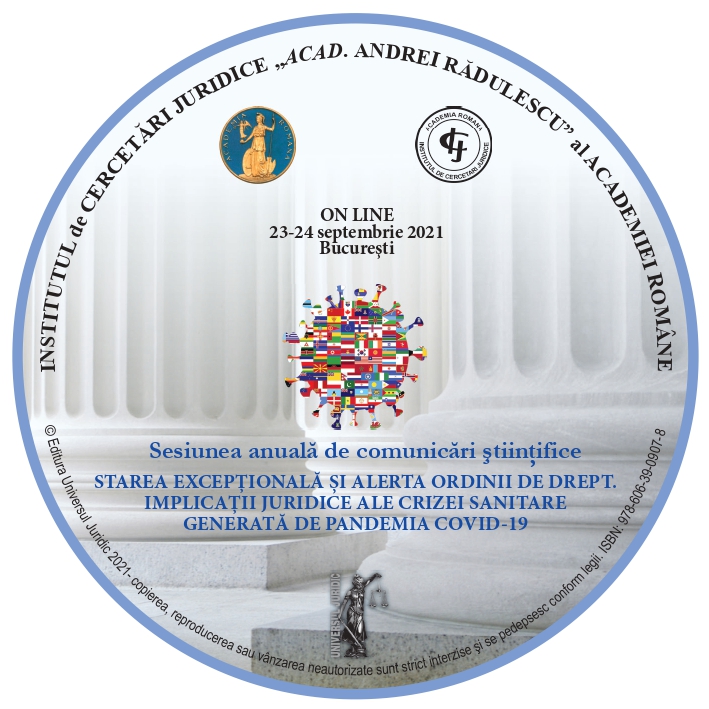
:The exercise of parental authority over the child and its assets belongs jointly to both parents and it aims to ensure the conditions necessary for the child's upbringing and development of the child’s personality, as well as the protection of the best interests of the child. In the event that one of the parents is dead, missing, unable to express his or her will or if by court decision one of the parents has been granted the exclusive exercise of parental authority over the child, parental authority is exercised exclusively by one of the parents. As for the child’s assets, there is a special situation in which one of the parents is a minor, having limited ability to exercise parental authority. According to the current case law, the exercise of parental rights and the fulfillment of parental obligations regarding the child's assets encounters certain difficulties, especially in situations in which only one of the parents has the right to exercising parental authority. The problem mainly lies in the necessity and opportunity for the guardianship authority to authorize certain documents that the parent must conclude, regarding his or her child’s assets.
More...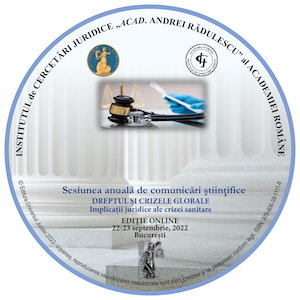
This study represents an assessment of Law no. 151/2015 both from a scholarly point of view and especially from the point of view of the recent case-law. Upon analyzing this piece of legislation from a comparative standpoint as well as from the perspective of the specificities pertaining to the Romanian judicial system, we believe that the goal pursued by the legislator would be easier to achieve if an amendment/supplement were made that would aim at fine-tuning certain texts that had caused difficulties in practice.
More...
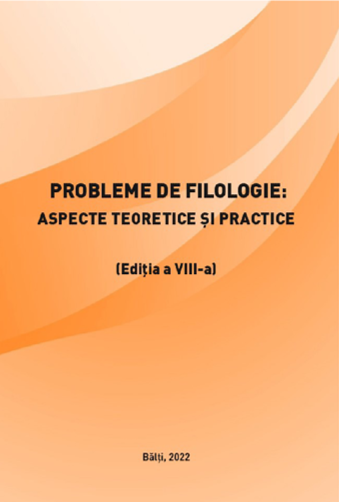
This article describes the process of simulation like an interactive andcommunicative method. The article begins with 6 definitions which arepresented and analysed. Furthermore, the aspects of application of simulation aredescribed at the German lesson. At last, the differences and similarities betweensimulation, roleplaying games, theater games and planning games are broughtup.
More...
n a world where the use of IT and Communications technologies is afundamental characteristic, they will represent the central element in education,involving changes in educational policies, both in setting targets andin developing strategies, securing resources and training specialists.This article aims to demonstrate the necessity of using IT technologiesby introducing educational software in the study process. In this article, oselection of 3 digital tools (learning apps, padlet, word clouds)are presented in practice and the selection criteria for the lessons are givenGerman language. We also present and analyze the possible uses ofdigital media in German language lessons that are based on certainconstructivist characteristics.
More...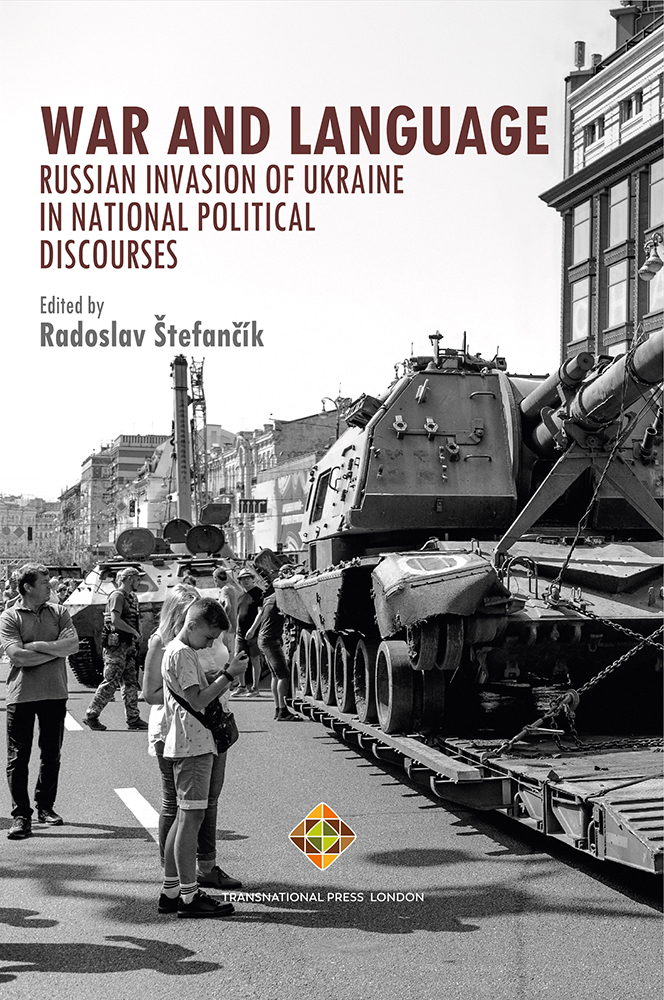
This article is devoted to the language of the crisis that developed in Europe after Russia’s invasion of Ukraine on February 24, 2022. Olaf Scholz, the Chancellor of the Federal Republic of Germany, is the political leader of the Social Democratic Party of Germany (SPD). He was elected on December 8th, 2021 after Angela Merkel (CDU) stepped down after 16 years of being Germany´s leader. This article will focus on how the new federal government reacted to this crisis. Our point of view will be supported by a pragmatic-linguistic analysis of the groundbreaking political and media speeches and statements of Scholz and other important German politicians. The contribution focuses on analyzing and evaluating statements which are presented in the form of selected lexis, multi-word units, and sentences. The introduction to the problem is formed by the characteristics of the current media and their importance and influence on the public. In addition, the current social media problems in Germany, Russia, and Europe are described and the role of Russia in the current use of information warfare and propaganda (Informationskrieg) is discussed. This concerns the manipulation of the Russian, European, and German populations through Russian disinformation regarding the war. It is important to assess the position of such a great power as Germany and its partners because they play a decisive role in all European conflicts.
More...